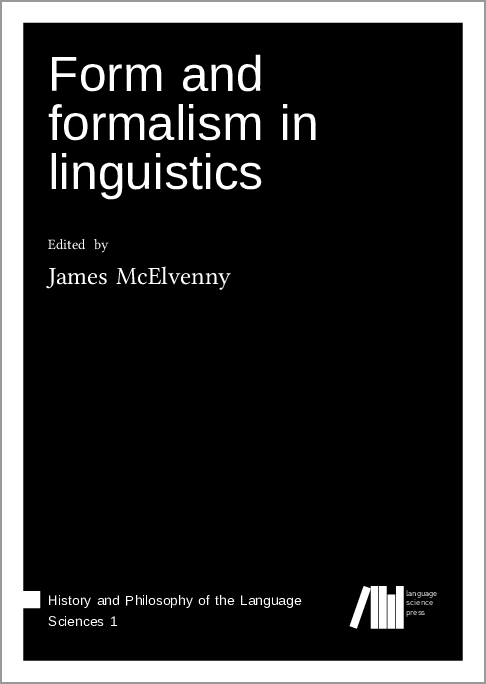We log anonymous usage statistics. Please read the privacy information for details.
Form and formalism in linguistics
Synopsis
"Form" and "formalism" are a pair of highly productive and polysemous terms that occupy a central place in much linguistic scholarship. Diverse notions of "form" – embedded in biological, cognitive and aesthetic discourses – have been employed in accounts of language structure and relationship, while "formalism" harbours a family of senses referring to particular approaches to the study of language as well as representations of linguistic phenomena. This volume brings together a series of contributions from historians of science and philosophers of language that explore some of the key meanings and uses that these multifaceted terms and their derivatives have found in linguistics, and what these reveal about the mindset, temperament and daily practice of linguists, from the nineteenth century up to the present day.
Chapters
-
Preface
-
Visual formalisms in comparative-historical linguistics
-
Alternating sounds and the formal franchise in phonology
-
On Sapir’s notion of form/pattern and its aesthetic background
-
Linguistics as a "special science"A comparison of Sapir and Fodor
-
The impact of Russian formalism on linguistic structuralism
-
The resistant embrace of formalism in the work of Émile Benveniste and Aurélien Sauvageot
-
Linguistics as a science of structure
-
Formalism, grammatical rules, and normativity
-
Linguistic form: A political epistemology
Reviews
- Video introduction by the author published July 1, 2019
-
Review in Historiographia Linguistica 46:3 (2019)
by Christopher Hutton
published March 17, 2020
... In this reviewer the volume induced nostalgia for a lost discipline called General Linguistics, a field of inquiry which now seems to lead a primarily virtual existence, in the writing of the history of linguistics. General Linguistics has been defined by two contradictory impulses: the first has been the desire to develop an autonomous theory of linguistic description and analysis; the second has been the conscious or unconscious necessity of responding to the wider intellectual, social, political and ideological developments within which the discipline was set. I came away from this volume with the feeling that linguistics is destined Sisyphus-like to strive ever upward towards a scientific method operating on an independently given object of study, namely linguistic form; yet it must constantly tumble back down when faced with the demands of the hermeneutic, the personal, the aesthetic, the contextual, the social, and the affective.
-
Review in Language & History
by Randy Allen Harris
published March 31, 2020
First things first: don’t miss the digital price. It’s free! The hardcover is handsome, stitch-bound, reads beautifully, is extraordinarily well priced, and even has the sort of built-in string bookmark usually reserved for bibles and classical poetry. I’m happy to have it on my shelf, at close reach. But the digital copy is an offer you can’t refuse. Not everything free is worth the price, however, and the real cost of a book, whatever its assigned monetary value, is paid in time. Let me assure you: Form and Formalism in Linguistics abundantly repays hours and hours of investment. ...




